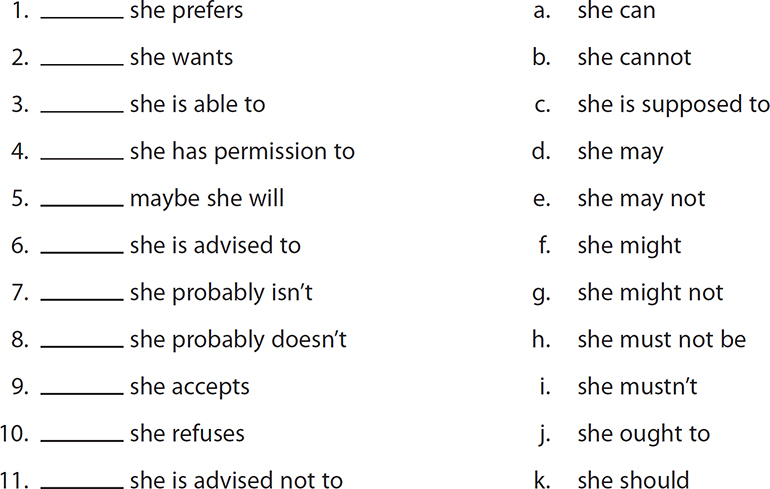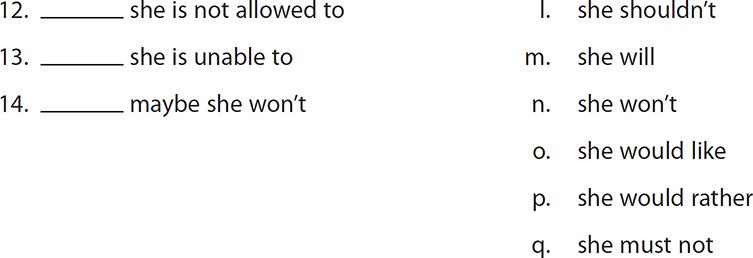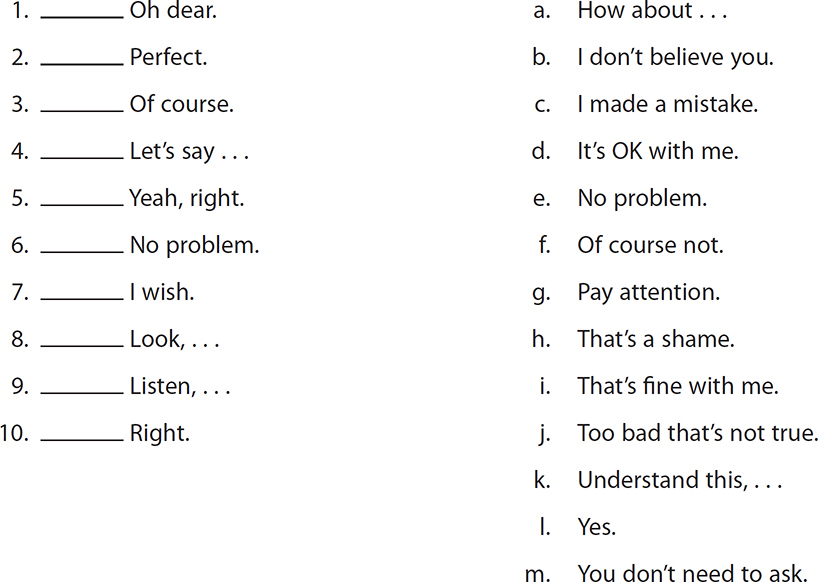Making dates and appointments
Conversation A: Making an appointment with a doctor
RECEPTIONIST: Drs. Manning and Sharp. How can I help you?
LISA: Hello. My name is Lisa Peterson. I’d like to make an appointment to see Dr. Sharp, hopefully sometime next week.
RECEPTIONIST: And what is it you want to see him about?
LISA: I need a complete physical for a new job I’m about to take.
RECEPTIONIST: Do you have a form that has to be filled out?
LISA: Yes, I do—and it looks like I’ll need a pretty thorough exam.
RECEPTIONIST: Can you fax it to me? That way I’ll know how much time to allot for your appointment.
LISA: Sure. Can you give me your fax number?
RECEPTIONIST: It’s 202-739-5906.
LISA: Good. I’ll fax it to you right away. Will you call me back when you get it?
RECEPTIONIST: Right.
Later:
RECEPTIONIST: Hello, Lisa. This is Dr. Sharp’s office. I see you’re going to need an hour-long appointment, and Dr. Sharp won’t be able to do that for at least another month. I could give you an appointment with Dr. Manning next Thursday, though, at 1 p.m. Would you like to take that?
LISA: Um . . . yes, that sounds fine. Is there anything I should do to prepare for the exam?
RECEPTIONIST: Yes. I know this will be difficult, but you mustn’t eat or drink anything after midnight the night before. I wish I could give you an appointment earlier in the day, but we don’t have any other openings.
LISA: OK. But if there is a cancellation earlier in the day, please let me know. I’d much rather come in early in the morning.
RECEPTIONIST: Of course.
LISA: Thanks very much. Good-bye.
Conversation B: Changing a lunch date
LISA: Hi, Maria. It’s Lisa. Listen, I’m not going to be able to have lunch with you next Thursday. I have to have a physical for my new job, and it’s on Thursday at one o’clock—and it’s in Alexandria. I’m really sorry. Can we make it another day?
MARIA: No problem. How about Friday at 12:30?
LISA: Oh dear, I can’t do that, either. Could you do Wednesday?
MARIA: Look, we’re going to have to make it the following week. We’ve both got too much on our plates right now. Let’s say Thursday, the twenty-fourth, at one o’clock. OK?
LISA: Perfect. We’ll have a lot to talk about by then!
Improving your conversation
In/on/at to indicate events
Events—dates, appointments, meetings, receptions, parties, concerts, classes, etc.—all have set days, times, and locations that are indicated by certain prepositions.
In indicates the month or year of an event.
Her birthday dinner is in October.
The celebration is in 2014.
On indicates the day or date of an event.
The appointment is on Friday.
Our classes are on Tuesdays and Thursdays.
Her party is on August 13.
At indicates the time of an event.
The reception is at ten o’clock.
The concert is at 4:30.
Periods of the day are indicated as follows:
in the morning
in the afternoon
at night
At indicates the location of an event or number in the street address.
The movie is at the State Theater.
The State Theater is at 405 S. Washington Street.
On indicates the name of the street in the address of the location.
The movie is at the theater on State Street.
In indicates a location of an event where the address is already understood.
The movie is in Theater A.
The meeting is in the boss’s office.
Modal auxiliaries
Following are explanations of the different uses of modal auxiliaries—verbs that modify other verbs in certain ways. They have the same conjugation in all forms.

Will can indicate a prediction for the future. The negative form of will is won’t.
We will get fat if we eat too much candy.
He won’t be here long—he’s leaving in a few minutes.
Will + probably indicates what is likely to happen.
I will probably be home after midnight.
She probably won’t be with me.
Will is used to ask and accept favors.

Won’t is used to refuse to do something.

Can indicates ability. The negative form of can is can’t.
Present tense: She can cook like a pro. She can’t sing, though.
Past tense: She could cook when she was very young. She couldn’t sing then, either.
An alternative way to indicate ability is be able to.
She is able to cook.
She was able to cook when she was young.
She will be able to cook like a pro when she finishes culinary school.
Can also indicates permission.
Present tense: He can’t go to the movies with us. (His mother said no.)
Past tense: He couldn’t go to the movies with us.
Future: He won’t be able to go to the movies with us.
May is another way to ask for and give permission.

May can also indicate possibility. Alternative ways to indicate this are might and maybe + will.
It may rain tomorrow.
It might rain tomorrow.
Maybe it will rain tomorrow.
Could, in addition to being the past tense of can, also indicates a suggestion.

Could is also a polite way to ask permission.

Should indicates direct or indirect advice.
What should I wear to the interview?
You should go home now.
He shouldn’t be here.
Past tense: You should have gone home.
Ought to can be used to give direct or indirect advice. It is not used in a question or in negative form.

Would is used with if to indicate how things could be different under different circumstances.
If I were the teacher, I would make sure the children had fun while learning.
Would like is a polite way to say what you want.
We would like three ice-cream cones.
They would like donuts.
Would rather is a way to indicate preference. It is often contracted to I’d, you’d, he’d, she’d, they’d.
She is teaching geometry, but she would rather teach algebra.
I’m leaving now, but I’d rather stay here.
Would can also be a past tense marker, indicating repeated or habitual activity to describe the past.
When we were little, we would go to my grandmother’s house every Sunday for dinner.
I would always play with my cousin, Bobby.
Sometimes, we would get into trouble.
Must indicates probability. The negative form is not contracted for this meaning.
He left at four o’clock, so he must be in Chicago by now.
She doesn’t answer her phone. She must not be home.
Must not indicates prohibition or strong advice. It is often contracted to mustn’t.
You must not put your feet on the table.
You mustn’t walk alone after dark.
Have to
Have to indicates obligation or necessity.

Supposed to
Supposed to indicates advice to follow a custom.
We’re supposed to be seated at our desks before the bell rings.
You’re not supposed to text during class.
Wish
To wish means to be sorry that something is not true. It is followed by a verb in the subjunctive mood. Present tense subjunctive forms are as follows:
The verb be: use were for all subjects (I, you, he, she, it, we, they).

All other verbs: use the past tense form.

I wish! indicates that it would please you if something said were really true, even though you believe that it isn’t true.

How about . . . ?
How about . . . ? is a way of making a suggestion.

Let’s say
Let’s say is a way of making a more forceful suggestion.

Oh dear
Oh dear is an exclamation that indicates you wish something weren’t true or hadn’t happened.
Oh dear, I dropped my bag and my stuff is everywhere.
Oh dear, I said Friday and I meant Thursday. I’m so sorry.
Look
Look is an expression that indicates that you want the person you are speaking to to understand what you are going to say next.

Listen
Saying listen indicates that you want the person you are speaking to to pay attention to what you are going to say next.

Both
Both is used as a pronoun or adjective to refer to any two people, places, objects, or abstract notions.
I invited Todd and Carlos. I hope both of them can come.
We went to New York and Washington. Both are fascinating cities./They are both fascinating cities./Both cities are fascinating.
I couldn’t decide which shoes to buy, so I bought both pairs.
Though
Though can be used to mean however—indicating that there is an alternative answer.

Have too much on one’s plate
To have too much on one’s plate is an expression that indicates that someone is very busy—probably because of an unusual project or happening.
Look—I’d like to help you out, but we just moved to a new house, I’m learning a new job, and I just have too much on my plate right now.
Right
Right indicates that you understand or agree with what was just said.

Yeah, right! is a sarcastic answer that indicates that what was said previously is ridiculous.

Perfect
Perfect indicates that you accept a suggestion or offer.

Of course
Of course indicates that what was said is agreed to or obvious.

No problem
No problem can mean that a request is accepted.

No problem can also be used as a reply to an expression of thanks. An alternative expression with the same meaning is you’re welcome.

Fill in each blank with the appropriate preposition (in, on, at).
1. The game is ______ Fairfax High School, ______ the gymnasium, ______ Saturday ______ eight o’clock ______ the evening.
2. Our wedding is ______ November ______ Springfield Country Club.
3. The inauguration is ______ 2013 ______ the Capitol ______ Washington, D.C.
4. The dinner is ______ Friday ______ six o’clock ______ the evening ______ Emily’s restaurant ______ the back room.
5. The show is ______ July 24 ______ one o’clock ______ the afternoon ______ the art gallery ______ Jefferson Avenue ______ Leesville.
Express the following using modal verbs or their alternatives.
1. (You are a student.) Ask your teacher for permission to leave the classroom.
________________________________________________________________
2. (You are a teacher.) Tell your students that they are not allowed to leave the classroom.
________________________________________________________________
3. Ask your friend if it is important for him to work today.
________________________________________________________________
4. (You are the boss.) Tell your employee that she is obligated to work tomorrow.
________________________________________________________________
5. (You are sick.) Ask your doctor for her advice about when to take the medicine she prescribed.
________________________________________________________________
6. (You are a doctor.) Tell your patient that it is customary to take the medicine just before a meal.
________________________________________________________________
7. (You are a police officer.) Tell a pedestrian not to jaywalk (cross the street in the middle of a block).
________________________________________________________________
8. (You are a pedestrian.) Ask a police officer if it is necessary for you to wait for a green light before crossing.
________________________________________________________________
9. (You are a waiter.) Ask your customer if he prefers his steak medium or well done.
________________________________________________________________
10. Invite your friends to a party at your house on Saturday night.
________________________________________________________________
11. Ask your brother to pick you up at the airport.
________________________________________________________________
12. Tell your sister that you refuse to pick her up.
________________________________________________________________
Match the words or expressions in the first column with the words or expressions in the second column that have a similar meaning. There may be more than one match for each item.


Fill in each blank with the correct form of the indicated verb.
1. I wish you (be) _______________ here.
2. She wishes she (can) _______________ go to school.
3. We wish they (will) _______________ call us.
4. I wish we (have) _______________ more time.
5. They wish I (do not) _______________ spend my money on cars.
6. He wishes he (be) _______________ back home.
7. Don’t you wish it (be) _______________ your birthday?
8. I wish I (can) _______________ tell you the news.
9. I wish she (call) _______________ me more often.
10. They wish she (live) _______________ closer to their house.
Write a sentence using I wish to indicate your dissatisfaction with the statement.
1. You don’t love me.
________________________________________________________________
2. My neighbors make a lot of noise.
________________________________________________________________
3. My mother isn’t here.
________________________________________________________________
4. I’m not married.
________________________________________________________________
5. She can’t stay here tonight.
________________________________________________________________
6. He won’t move his car.
________________________________________________________________
7. She drives too fast.
________________________________________________________________
8. They come home late.
________________________________________________________________
9. I don’t have enough money.
________________________________________________________________
10. Our house is too small.
________________________________________________________________
Circle the most appropriate response to each question or remark.
1. I wish we could take a vacation.
a. Perfect.
b. Yeah, right.
c. Look—we can’t afford it.
d. Oh dear.
2. We’d rather go to the mountains than the beach.
a. Listen—why don’t you go to the mountains, and we’ll go to the beach.
b. Look—I’m tired.
c. Perfect. Let’s say we all go to the beach.
d. Oh dear. Then we’ll all go to the beach.
3. Can you help me with these packages?
a. Oh dear, I can.
b. Oh dear, I can’t.
c. Let’s say no.
d. Perfect.
4. Are you graduating in June?
a. No problem!
b. I wish!
c. You have too much on your plate.
d. I mustn’t.
5. Why is your project late?
a. No problem!
b. Of course!
c. I have too much on my plate!
d. Right!
Match the words or expressions in the first column with those in the second column that have a similar meaning. There may be more than one match for each expression.

Write a question or remark for each of the following responses. Ask an English-speaking friend to check your answers.
1. ___________________________________________________
Yeah, right.
2. ___________________________________________________
I wish!
3. ___________________________________________________
Of course!
4. ___________________________________________________
No problem.
5. ___________________________________________________
Right.
Write the details (name of event, day, date, time, location) of two events: one that you attended recently and one that you plan to attend in the near future. Ask an English-speaking friend to check your work.
Past event:
________________________________________________________________
________________________________________________________________
________________________________________________________________
Future event:
________________________________________________________________
________________________________________________________________
________________________________________________________________
Write a telephone conversation in which you make an appointment with a professional of some kind (doctor, lawyer, teacher, businessperson, etc.). Use at least eight of the expressions explained in this chapter. Ask an English-speaking friend to check your work.
__________________________________________________________
__________________________________________________________
__________________________________________________________
__________________________________________________________
__________________________________________________________
__________________________________________________________
__________________________________________________________
__________________________________________________________
__________________________________________________________
__________________________________________________________
__________________________________________________________










